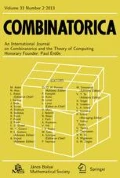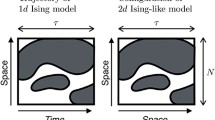Abstract
We consider a simple abstract model for a class of discrete control processes, motivated in part by recent work about the behavior of imperfect random sources in computer algorithms. The process produces a string ofn bits and is a “success” or “failure” depending on whether the string produced belongs to a prespecified setL. In an uninfluenced process each bit is chosen by a fair coin toss, and hence the probability of success is ¦L¦/2n. A player called the controller, is introduced who has the ability to intervene in the process by specifying the value of some of the bits of the string. We answer the following questions for both worst and average case: (1) how much can the player increase the probability of success given a fixed number of interventions? (2) in terms of ¦L¦what is the expected number of interventions needed to guarantee success? In particular our results imply that if ¦L¦/2n=1/Ω(n) where Ω(n) tends to infinity withn (so the probability of success with no interventions is 0(1)) then withO(√n logΩ(n)) interventions the probability of success is 1−0(1).
Our main results and the proof techniques are related to well-known results of Kruskal, Katona and Harper in extremal set theory.
Similar content being viewed by others
References
N.Alon and M. O.Rabin, On the random properties of a weakly random source, in Advances in Computing Research (Silvio Micali, ed.),to appear.
M.Ben-Or and N.Linial, Collective Coin Flipping, robust voting schemes and minimal of Banzhaf values,Proceedings of the 26th Annual IEEE Symposium on Foundations of Computer Science, 1985, 408–416.
M.Ben-Or, N.Linial and M.Saks, Collective collective coin flipping and other models of imperfect randomness, Proceedings of edi.
B.Chor and O.Goldreich, Unbiased bits from sources of weak randomness and probabilistic communication complexity,Proceedings of the 26th Annual IEEE Symposium on Foundations of Computer Science, 1985, 429–442.
B.Chor, O.Goldreich, J.Hastad, J.Friedmann, S.Rudich and R.Smolensky, The bit extraction problem ort-resilient functions,Proc. 26th IEEE Symposium on Foundations of Computer Science (1985), 396–407.
D. E.Daykin, Ordered ranked posets, representations of integers and inequalities from extremal ranked posets,in Graphs and Order (I. Rival, ed.). D. Reidel Publishing, 1985, 395–412.
C.Greene and D. J.Kleitman, Proof techniques in the theory of finite sets,in Studies in Combinatorics (G.-C. Rota, ed.), MAA Studies in Mathematics,17 (1978), 22–79.
L. Harper, Optimal numberings and isoperimetric problems on graphs,J. Comb. Th.,1 (1966), 385–393.
G. Katona, A theorem for finite sets, inTheory of Graphs (P. ErdŐs and G. Katona, eds.), Hungarian Academy of Science, Budapest, 1966, 187–207.
J. B. Kruskal, The number of simplices in a complex, inMathematical Optimization Techniques (R. Bellman, ed.), University of California Press, Berkeley, 1963, 251–278.
M. Santha andU. V. Vazirani, Generating quasi random sequences from slightly random sources,J. Comp. Sys. Sci.,33 (1986), 75–87.
U. V. Vazirani, Towards a strong communication complexity theory or generating quasi-random sequences from two communicating slightly-random sources,Combinatorica,7 (1987), 375–392.
U. V.Vazirani, Randomness, Adversaries and Computation,Ph. D. dissertation, U. C. Berkeley, 1986.
U. V.Vazirani and V. V.Vazirani, Random polynomial time is equal to semi-random polynomial time,Proc. 26th IEEE Symp. on Foundations of Computer Science (1985), 417–428.
Author information
Authors and Affiliations
Additional information
Supported in part by NSF Grant DMS8703541 and Air Force Office of Scientific Research Grant AFOSR-0271.
Rights and permissions
About this article
Cite this article
Lichtenstein, D., Linial, N. & Saks, M. Some extremal problems arising from discrete control processes. Combinatorica 9, 269–287 (1989). https://doi.org/10.1007/BF02125896
Received:
Revised:
Issue Date:
DOI: https://doi.org/10.1007/BF02125896



